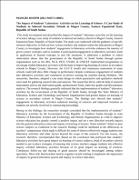| dc.description.abstract | MANGBI JOSEPH (2011-MO71-10005)
The Impact of Students’ Laboratory Activities on the Learning of Science: A Case Study of Students in Selected Secondary Schools in Magwi County, Eastern Equatorial State, Republic of South Sudan.
This study investigated and described the impact of students‟ laboratory activities on the learning of science taking a case study of students in selected secondary schools in Magwi County, Eastern Equatorial State, Republic of South Sudan. The study was conducted with the guidance of specific research objectives: to find out how science teachers and students utilise the laboratories in Magwi County; to investigate how students‟ engagement in laboratory activities enhances the mastery of given science concepts; and to examine if participation/engagement in laboratory activities leads to application of learned concepts in real life situations. It addressed a problem in which observation shows that the government of the Republic of South Sudan through partner organisations such as the JRS, NCA, DOT, USAID, & UNICEF implemented programmes to encourage student laboratory activities with the hope of improving learning of science in secondary schools in Magwi County. However, the S.S.C.E results and continuous assessment of some schools could still show little change in performance despite continuous engagement of students into laboratory activities and continuous in-service training for teachers during Holidays. The researcher, therefore, adopted a case study design in which quantitative and qualitative methods were used for gathering research data and analysis. The researcher did so with the help of research instruments such as the observation guide, questionnaire forms, interview guides and documentary analysis. The research findings generally indicated that the implementation of students‟ laboratory activities by the Government of the Republic of South Sudan, through Her State Ministry of Education, Science and Technology and Partner Organisations had greater impact on learning of science in secondary schools in Magwi County. The findings also showed that students‟ engagement in laboratory activities enhanced learning of sciences and improved retention as students are actively involved in constructing knowledge.
Basing on the findings, the researcher strongly concluded that the implementation of students‟ laboratory activities by the Government of the Republic of Southern Sudan through its state Ministry of Education, Science and Technology and Partner Organisations in a bid to improve science education has greatly created a positive impact and set a new direction towards inquiry into the general education system and inquiry in learning of science. Some students‟ failure to pass science subjects as evidenced in the research findings could be attributed to the differences in teachers‟ competences which made it difficult for some of them to effectively engage students into laboratory activities and other factors beyond the scope of this research. For this reason, the research, therefore, recommended that; Based on the conclusion that portrayed that students‟ laboratory activities have great impact on learning of science subjects, head of secondary schools needed to put in place strategies of ensuring that science teachers engage students into effective inquiry oriented laboratory activities because of its great impact on learning of sciences. Continuous follow-up and sharing of good practice should be encouraged among subject specialists. More still, head teachers need to organise on-job training to emphasise the importance of inquiry in general education system and inquiry in science education.
Key Words: Students’ Laboratory, Science, Secondary Schools, Eastern Equatorial State, Republic, South Sudan. | en_US |


